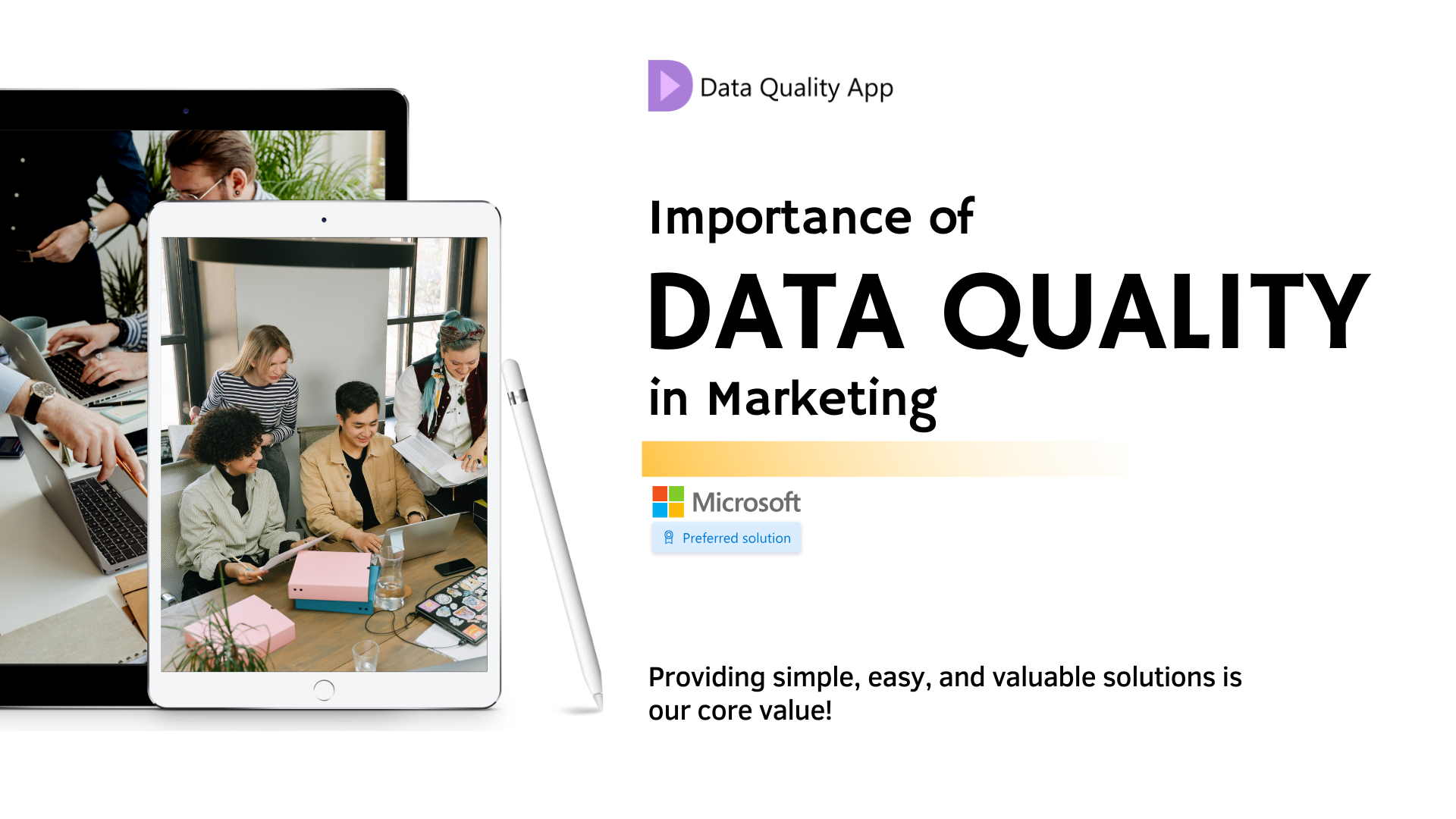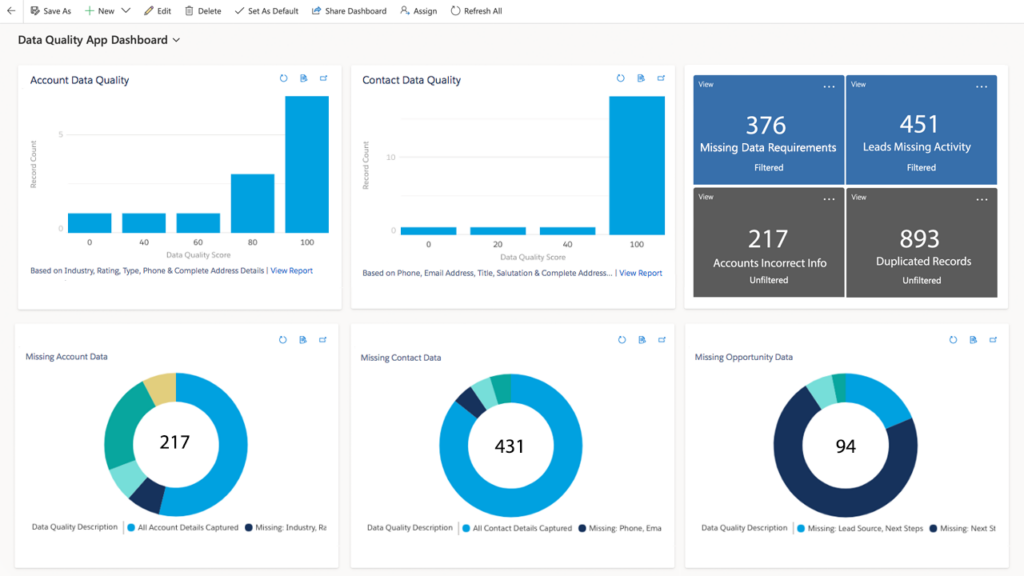
Data Quality App: Importance of Data Quality in Marketing!
In the marketing world, good data quality isn’t a luxury, it’s the currency that buys you relevance and engagement. Don’t skimp on it!
What is Marketing, and What’s Its Purpose?
Essentially, marketing is about promoting a company’s product or service to a target audience through high-quality messaging. The goal of marketing is to demonstrate product value, strengthen brand loyalty, and increase sales by delivering standalone value to prospects and consumers through content.
What Is Data Quality?
Data quality refers to a data set’s suitability for a particular purpose or use case. Data quality can be measured by accuracy, completeness, timeliness, uniqueness, consistency.
Who Bears the Responsibility for Data Quality?
Data quality is a shared responsibility across the organization.
It’s not just up to one team or individual to ensure that data is accurate and reliable. Every person who interacts with the data, from sales reps to customer support agents, plays a role in maintaining its quality.
So, whether you’re inputting new data or utilizing existing information, it’s crucial for everyone to contribute to its accuracy and integrity.
Why Is Data Quality Important?
The first step towards successful digital-first initiatives is getting the data right.
As well as improving customer experience, data quality helps customers respond to their needs. Front-line salespeople and service representatives fear being unable to respond to customers. It is possible to overcome this challenge by improving data quality and eliminating time-consuming, non-value-added activities.
Investing in high-quality data can provide businesses with a competitive advantage by mitigating risks and enhancing efficiency and productivity. This, in turn, fosters informed decision-making, facilitates more impactful campaigns, enables precise audience targeting, and cultivates superior customer experiences. Moreover, organizations dedicated to data quality are empowered to leverage their insights into customers, prospects, and vendors, thereby exerting a tangible influence on both top-line revenue and bottom-line profitability.
On the downside, lousy data messes up digital efforts, hurting a company’s competitiveness and making customers doubt them.
How Good Data Quality Boosts Sales and Marketing Efforts?
Understanding customers or accounts is crucial for marketing and sales success. That’s why having good data quality is so important. Quality data drives marketing automation, which has changed how customers expect to receive relevant and timely information. It also improves collaboration between marketing and sales, leading to increased revenue and lower costs.
Marketers who rely on data make smarter decisions about how to spend their budget, targeting the right customers and passing promising leads to the sales team. With a complete view of each customer, sales teams can better manage their accounts and find opportunities to sell more products or services and provide better support.
What’s the Price of Poor Data Quality?
Bad data quality can seriously hurt businesses. According to a 2016 study by IBM, it costs the U.S. economy a whopping $3.1 trillion each year due to lower productivity and the higher costs of managing that data.

Measuring Data Quality
Measuring data quality involves looking at these main things: making sure the data is accurate, complete, consistent, conforms to set standards, unique, and updated on time. Each of these factors plays a role in how well the data works for different tasks.
· Accuracy: Data has to be right. You don’t want your team wasting time on wrong info, like calling the wrong numbers or typing in incorrect details. Accuracy is usually checked against a trusted source.
· Completeness: This is about having all the needed info for a task. For example, if you’re reaching out to customers, do you have their names, emails, and phone numbers? But it’s tough to keep up with all the data needed for every task.
· Consistency: Data should look the same across different parts of your business. For example, phone numbers should be in the same format no matter where you find them. But having consistent data doesn’t always mean it’s accurate or complete.
· Uniqueness: Do you have one record for each thing, or are there copies? Copies lead to confusion and wasted time, especially if they’re not complete or accurate.
· Timeliness: Data needs to be up-to-date, even in real-time if necessary.
Businesses change all the time, and if your data isn’t current, it’s not much use.
How to improve marketing with Data Quality App
Improving marketing with the Data Quality App involves leveraging its features to enhance the accuracy, completeness, and consistency of customer data, ultimately leading to more effective marketing campaigns.
Duplicate Management: Utilize the app’s duplicate detection and prevention capabilities to ensure that your customer database remains free from duplicate records, enabling targeted and personalized marketing efforts.
Data Quality Rules: Implement data quality rules within the app to validate and standardize customer data, such as email addresses, phone numbers, and addresses. This helps maintain data accuracy and consistency across your marketing campaigns.
Phonetic Fields Detection: Leverage phonetic fields detection to identify and correct any misspellings or variations in customer names or other data fields, ensuring accurate targeting and communication.
Real-Time Monitoring: Take advantage of the app’s real-time monitoring capabilities to continuously track the quality of your data and receive alerts or notifications regarding any issues or discrepancies that arise.
Dashboard Insights: Utilize the app’s dashboard to gain insights into the overall quality of your customer data, including key metrics such as data completeness, accuracy, and consistency. Use these insights to make informed decisions and prioritize data quality improvement efforts. By leveraging the Data Quality App effectively, marketers can ensure that they are working with high-quality data, leading to more successful and impactful marketing campaigns.
Duplicate Management Strategies
Duplicate management strategies involve implementing processes and tools to identify, prevent, and resolve duplicate records within a database effectively. Here’s an explanation of key duplicate management strategies:
· Duplicate Detection Rules: Define criteria and rules within your database or CRM system to automatically identify potential duplicate records based on specific attributes such as name, email address, phone number, or other identifying information. These rules can help flag potential duplicates as they are entered into the system or during regular data maintenance processes.
· Automated Merge: Implement automated processes to merge duplicate records identified by the duplicate detection rules. Automated merging ensures that duplicate records are consolidated into a single, accurate representation, reducing data redundancy and ensuring data integrity.
· Manual Merge: Manual merge processes are typically employed for handling complex or sensitive data scenarios where automated merging may not be appropriate or sufficient. While more time-consuming and resource-intensive than automated methods, manual merge allows for greater flexibility, accuracy, and control over the data consolidation process.
· Data Governance Policies: Establish data governance policies and guidelines to govern the creation, management, and maintenance of data within the organization. These policies should include rules for identifying, managing, and resolving duplicate records, as well as guidelines for data entry, validation, and quality assurance processes.
By implementing these duplicate management strategies effectively, organizations can maintain clean, accurate, and reliable data, ensuring better decision-making, improved operational efficiency, and enhanced customer experiences.
Conclusion
In conclusion, data quality is indispensable for successful marketing campaigns. By leveraging the Data Quality App, organizations can enhance data accuracy, improve decision-making, and drive better outcomes for their marketing initiatives. Invest in data quality today and unlock the full potential of your marketing efforts.
If you’re intrigued by what you’ve seen in this blog and are facing challenges with Data Quality in your organization, don’t hesitate to reach out. You can download our Data Quality App from www.dataqualityapp.com, Microsoft AppSource, or Azure Marketplace.
For personalized assistance, contact our support team at support@techio.dk.
You can read more blogs about Data Quality App here.


